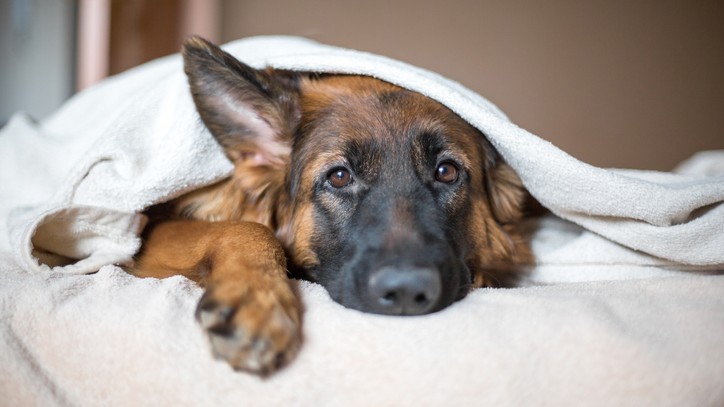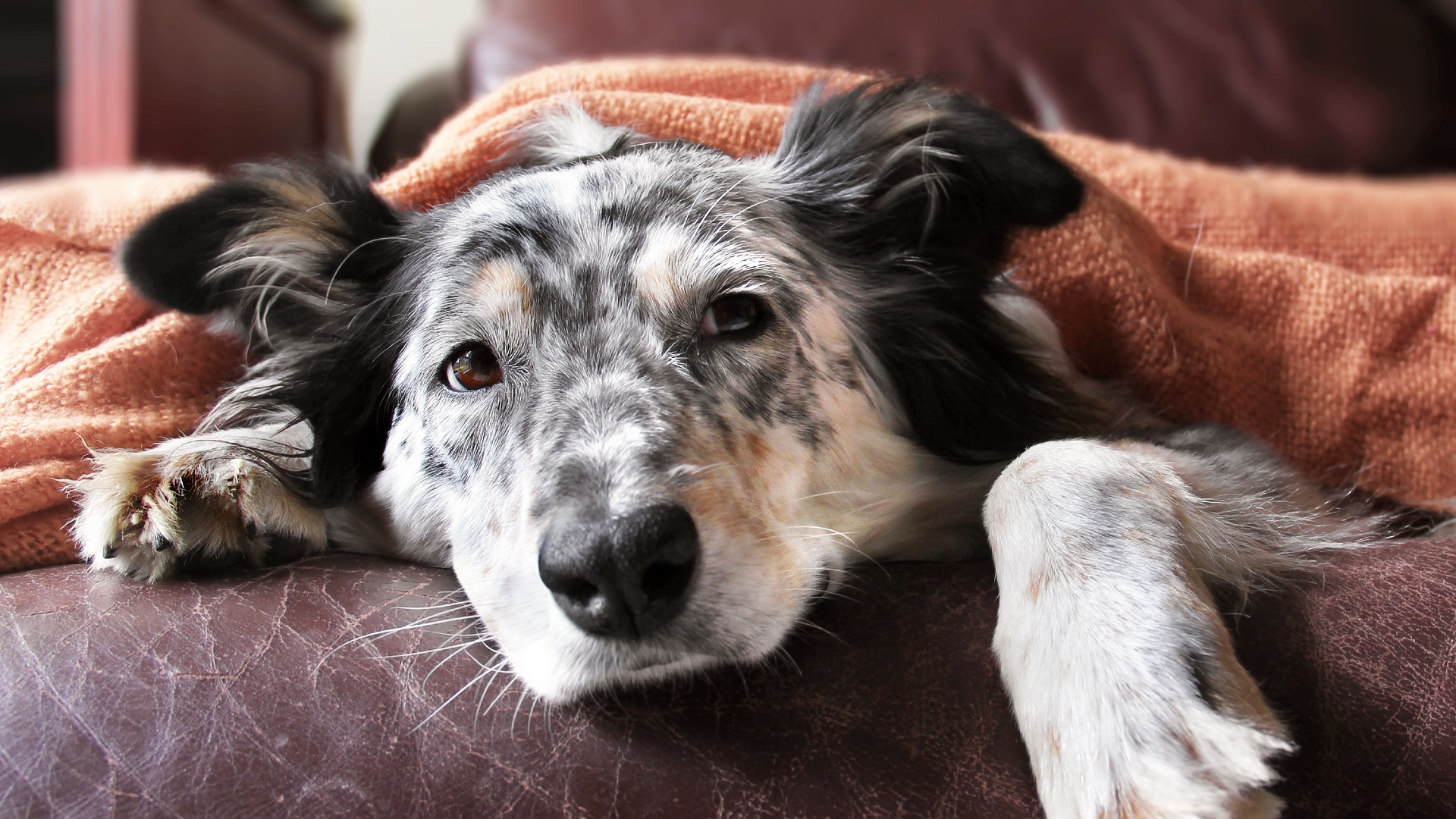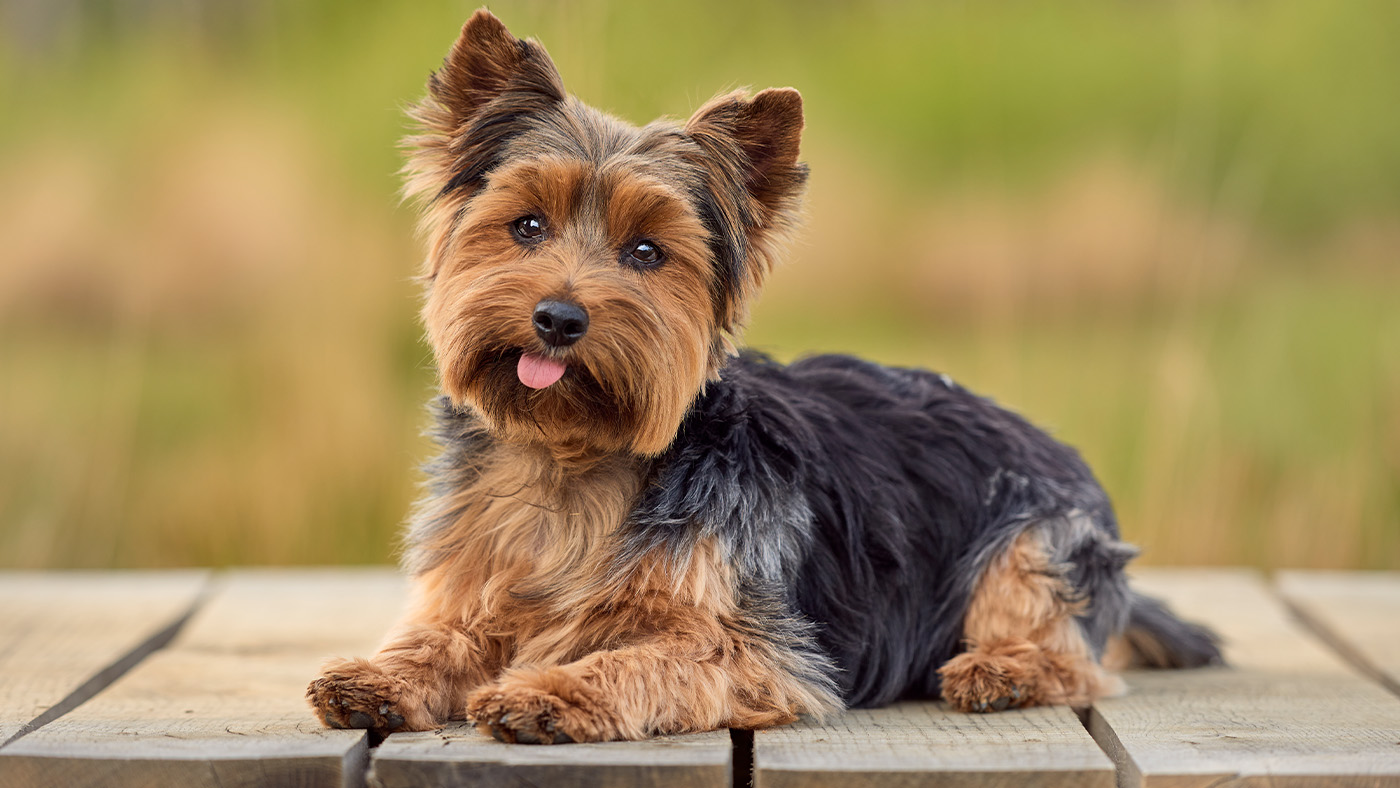How to help a dog with diarrhea: 5 tips to help your dog have perfect poop
If you have a dog with diarrhea, our vet's top tips will ensure they're back to their happy and healthy self in no time!

One of the most common problems presented to a vet is a dog with diarrhea. In fact, about 1 in 15 dogs will get diarrhea each year, and it’s the sixth most common reason for a trip to the vets.
Dogs can have poop problems caused by diseases, parasites, intolerances and even ‘dietary indiscretion’ – in other words, eating things they shouldn’t. Whatever the cause, dogs with diarrhoea are often uncomfortable.
So you’re probably wondering how you can stop your dog’s diarrhoea before it gets any worse. If you think it might be the result of a food allergy then consult your vet, and take a look at our guide to three common food allergies in pets.
If your vet does diagnose allergies, we’ve also compiled a list of the best dog food for allergies, which might prove some help in cases like these.
- Best dry dog food: Which brand of dry food is king of the kibble?
- Best dog toys: Six options to keep your pooch amused
- Best dry dog food: Which brand of dry food is king of the kibble?
What causes diarrhea in dogs?
Dogs can have diarrhea for a number of reasons. Usually the diarrhea resolves within a couple of days, without the need for any tests. Of course while this is great news for your pet, it does make diagnosis of the problem difficult!
These cases of diarrhoea are generally thought to be caused by dietary indiscretion. Often these dogs are known scavengers: from bins, or diving into bushes and re-appearing with half a sandwich hanging from their mouths. S
Sometimes, intolerances to certain foods play a part as well. Dogs given certain treats may have a flare up of diarrhea, or dogs may have ongoing mild or intermittent diarrhea, which resolves if the diet is changed. It’s important to note that changes in diet cause diarrhea too, especially if the diet is changed too quickly.
Diarrhea can also be infectious. Luckily we can vaccinate against parvovirus, but other, less deadly, infectious causes of diarrhea do exist. These cases often have a history of staying in kennels or going to the dog park, and several animals in the house will have the problem at the same time.
A virus is often to blame, and most cases resolve quickly with some supportive care. Of course, parasites such as worms can also cause diarrhea. Parasites are most common in puppies, but should always be considered when a dog hasn’t been wormed regularly.
If you aren’t sure if your dog is up to date with their worming, give your vet practice a call. While stress itself can cause diarrhea in dogs, it can also make a dog more vulnerable to these infectious causes.
Lastly, diarrhea can be a manifestation of another disease. Liver disease, pancreatitis and inflammatory bowel disease are all things to consider. Some types of cancer can also cause diarrhea. These are much more likely in dogs that have recurrent diarrhoea, or diarrhea that doesn’t resolve with treatment.
When should I take my dog to the vet with diarrhea?
Many causes of diarrhea do not need any veterinary intervention and will get better with some simple home care. However, there are some signs you need to watch out for:
- Diarrhea with blood
- If your dog is not up to date with their parvovirus vaccinations
- If your dog is very young and is not yet fully vaccinated
- Black, tar-like diarrhea
- Diarrhea which lasts more than 48 hours
- Diarrhea with vomiting lasting more than 24 hours
- If your dog is a young puppy, elderly or has an underlying medical condition (your dog may be more seriously affected and become dehydrated much faster)
- Lethargy or weakness
- Unproductive attempts to vomit (i.e. trying to be sick but not producing anything)
If your dog has any of these signs, or any additional symptoms other than diarrhoea, then it’s time to book an appointment with your vet.
How to stop dog diarrhea at home

As we’ve said, most cases of diarrhea will clear up with some simple home care. It’s very important that you follow these tips to ensure your dog recovers as quickly as possible.
1. Allow your dog to rest so they can heal
Sometimes we believe that going for a walk is the most important thing for our dogs. And whilst they do usually need the exercise and mental stimulation, there are times when they can take a break.
If you’ve ever had vomiting and diarrhea, you’ll understand that sometimes you just want to curl up and sleep. Don’t take your dog out for a walk unless they are likely to become more upset without one – instead, short trips out for toilet opportunities are best.
Remember, many types of diarrhea will make your dog need to go more frequently, so give them plenty of opportunity to go outside. As frustrating as it can be, remember never to punish them if they have an accident. After all, it’s not their fault!
2. Don't mess with your dog's diet
You might have heard that you need to feed your dog chicken and rice to make their diarrhoea go away. Or that you should give pumpkin for diarrhea. However, research has shown that changing your dog’s diet when they have diarrhea can do more harm than good.
Plain chicken and rice is deficient in a whole range of important vitamins and nutrients, so should never be fed for more than a couple of days. Instead, it’s better to feed a sensitive digestion food that’s specifically designed to help your dog with diarrhoea. Royal Canin Gastrointestinal and Hill’s i/d are two canned diets that are great for dogs with diarrhea.
3. Increase water intake
Every time your dog goes to the toilet and has diarrhea, they lose water from their body. Dogs with diarrhea can become dehydrated pretty quickly, so try to encourage water intake. Make sure your dog’s water bowl is clean and always full of fresh water.
You may also find that adding a small amount of flavouring encourages them to have a drink. You could try adding the drained water from a tin of tuna in spring water (never oil or brine), or the water from boiling a piece of chicken (always let it cool first of course!)
4. Give electrolytes
Just as in humans, diarrhoea robs your dog’s body of important electrolytes. Replacing these will enable your dog to rehydrate more effectively, making them feel better.
You can buy rehydration solutions specially formulated for pets, which are often flavoured to encourage your pet to drink. Oralade is a premixed solution, but powdered solutions are also available. Your vet will be able to advise you on the best product for your pet.
5. Add probiotics and prebiotics
Evidence supporting the importance of the bacteria living in our guts is mounting. The idea of feeding those ‘good’ bacteria, and topping them up from time to time, is becoming more popular. In fact, the first thing your vet is likely to recommend for a case of simple diarrhea is some gut support in the form of prebiotics and probiotics for dogs.
For dogs that have regular upset stomachs, adding a daily prebiotic can be helpful. For those that only have the occasional upset, it usually works best to use a prebiotic with added clay, to help absorb water and replace the good bacteria at the same time. YuDigest Plus is a powdered clay with added prebiotic, that helps to support the gut and firm the faeces. It’s not a prescription product, but should only be used under veterinary guidance.
If your dog is a regular diarrhea sufferer, your vet may recommend keeping a sachet (or a tube of something like ProKolin) in the cupboard to give for simple cases of diarrhoea. Despite popular belief, you should never yoghurt to your pet. Pets are often lactose intolerant, so it’s more likely to cause problems than it is to fix them.
Summary
97% of diarrhea cases resolve with simple care, either at home or with a little help from the vet. Remember to keep a close eye on your dog. You must call your vet for advice if your dog is getting worse, seems unwell in themself, or isn’t improving within a couple of days.
YuDigest Plus
A powdered probiotic containing montmorillionite and kaolin clay. It binds toxins in the gut, absorbs excess water, and replaces ‘good’ bacteria. Mix with food.
ProKolin
A paste containing beneficial micro-organisms and prebiotics, as well as kaolin clay to bind water and toxins and support gut health.
Oralade GI Support
A rehydration solution for cats and dogs. It’s highly palatable to encourage ill animals to drink, and contains probiotics and amino acids to keep the gut healthy.
PetsRadar Newsletter
Get the best advice, tips and top tech for your beloved Pets
After graduating as a vet from the University of Nottingham, Dr Joanna Woodnutt went on to practice companion animal medicine in the Midlands. Since then, she has also written for countless online and print publications and is a regular contributor for Edition Dog Magazine.

